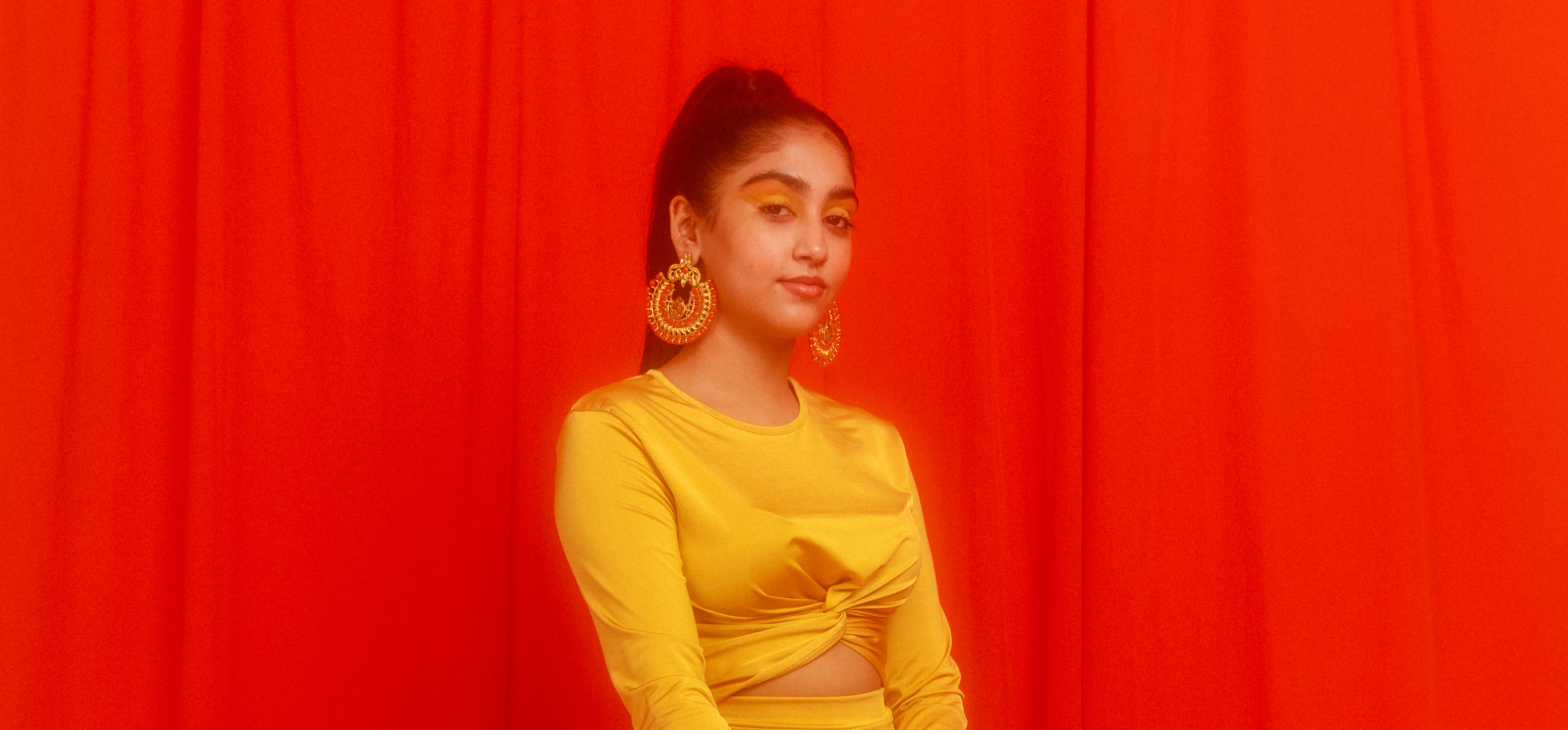
Photography by Alia Romagnoli @a8lia / Makeup by Marielle Mata @matalabs
‘You don’t see many young Asian girls out there, doing what they want’: teen actor Dúaa Karim finds her space
The Man Like Mobeen star talks maturity and how the BBC Three show is opening up doors for working class actors.
DiyoraShadijanova and Editors
04 Feb 2020
If you didn’t know that Dúaa Karim was an award-winning actress from the BBC’s Man Like Mobeen, you’d be forgiven for thinking she’s just a normal British teenager stressed out about her upcoming A-Level exams. I look her up on social media the night before our interview because I’m low-key curious to see if we like any of the same memes. A quick trawl through her Instagram shows videos of her singing and dancing, with a few selfies scattered in between. Her shared YouTube account with her sister is full of challenges, pranks and Ramadan vlogs.
Dúaa is a 17-year-old with 70,000 followers across Instagram, YouTube, Twitter and the entire world at her fingertips. But she’s relatable. As soon as she comes through the revolving doors of Broadcasting House, she hugs me like we’ve known each other for years. In this moment, I know she’s a sister. During our interview, she tells me that she spends her free time scrolling on her phone, sending messages on Snapchat, binging Riverdale on Netflix and sometimes begging her mum to let her go to a party or sleepover. She’s also learning to drive, but finding theory impossible.
Dúaa has her mum by her side to support her through the six-hour load of back to back interviews. She’s here to talk about the newest season of Man Like Mobeen, the British comedy-drama about an unconventional Muslim family based in Birmingham. It was created by comedian Guz Khan, who originally began making videos on YouTube as his character Mobeen. At the time, Guz was working as a teacher in Coventry but went viral when reacting to the Fox News segment which claimed Birmingham was a no-go area for non-Muslims and later when he called for a ban on Jurassic World for its use of the word “Pachy” as a nickname for Pachycephalosaurus. When Guz was offered his own show, Dúaa was cast for the role of Mobeen’s little sister, Aqsa.
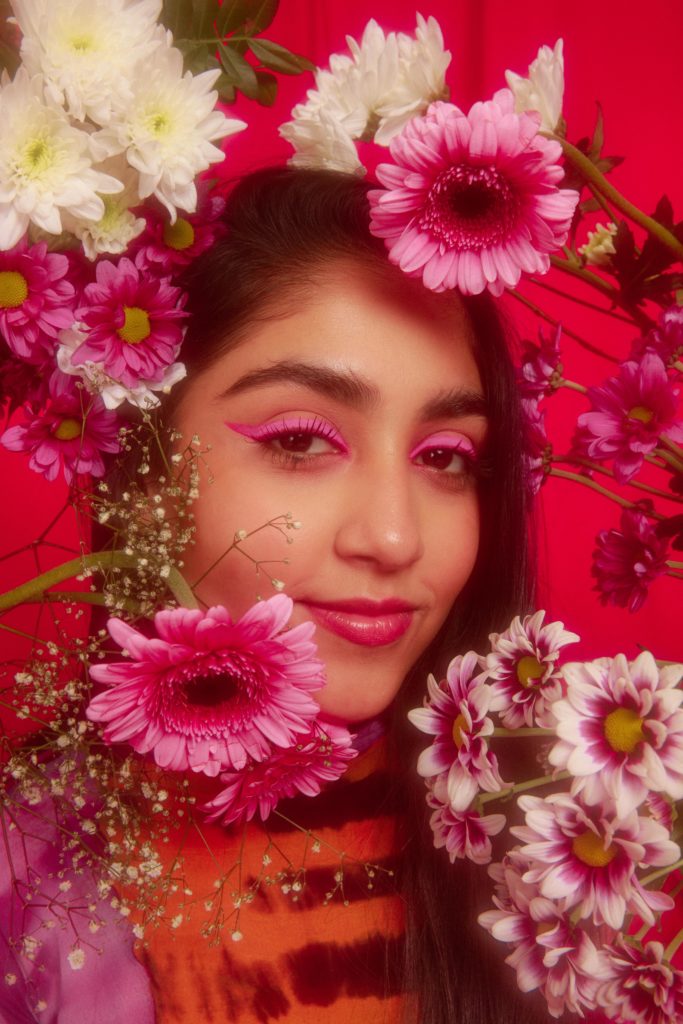
Photography by Alia Romagnoli 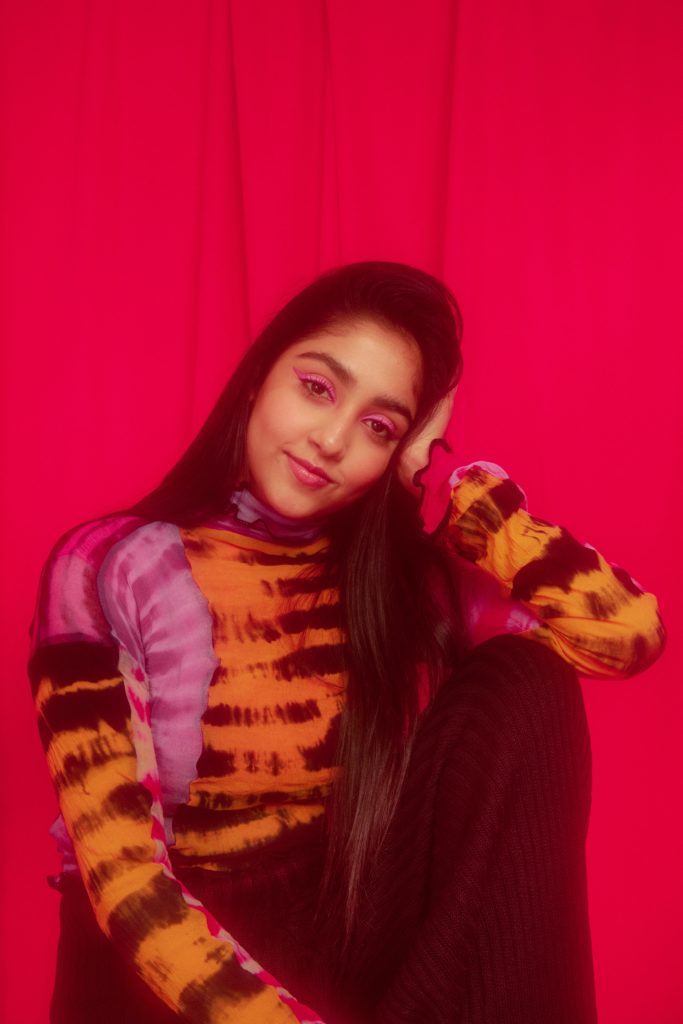
Photography by Alia Romagnoli
“It’s been amazing. It’s been a really big eye-opener because it’s made me realise that this is what I want to do in the future,” Dúaa says to me as we all sit down. “Little Aks is literally me and I’m Little Aks. She’s very strong and speaks what’s on her mind. I feel like I’ve gotten more like that since playing her.” In the latest season of Man Like Mobeen, Aqsa, is more grown up. She keeps getting into fights at school, so she’s told she must commit to a good cause to prevent her from being excluded completely. But of course, Mobeen and Aqsa’s efforts never go to plan. We get to witness emotional heart-to-hearts and bonding experiences between the pair. This storyline is somewhat familiar to Dúaa. She reveals that before she started acting, she also used to get in trouble with school. “My mum used to get phone calls all the time. But when I started Man Like Mobeen, there were never any phone calls. I directed my energy into something new, I have matured in that aspect. I decided to stay out of everyone’s business.”
I meet Dúaa again for her photoshoot in East London. She says it’s the first one she’s ever done. Sitting quietly and patiently as the makeup goes on, she absorbs the conversations around her. That’s until someone mentions Love Island. Her face lights up as she reveals she’s rooting for Nas and absolutely cannot stand Siannise. Her mum, who is a professional hairstylist, is there with her and does her hair once the makeup is applied. Dúaa jokingly asks her if she can go on Love Island next year and is met with a chuckle. If you only saw this interaction, you’d easily mistake them for sisters. You can tell Dúaa is a natural in front of the camera – her poses are poised and confident. And her mum watches her, proudly.
“I’ve had a lot DMs since the first series saying stuff like ‘Oh my God, you’ve made my parents open their eyes and accept that acting and singing is what I want to do’”
Dúaa Karim
Dúaa is from a working class British Pakistani background and one of three daughters in her family. Her favourite aspects of being Pakistani are the food she’s grown up with, as well as dressing up for important occasions like weddings and Eid. We exchange our experiences of doing Ramadan for the first time last year and laugh about the length of time it takes to get ready for traditional occasions. She feels privileged to be one of the few South Asian Muslim women to be given such a platform at her age. Currently, the representation is practically non-existent and when it is, it’s often riddled with offensive and inaccurate stereotypes. It’s common that South Asian women are fetishised, spoken for in or seen through a white gaze in popular culture. Unfortunately, this sentiment carries across all forms of television – from the news all the way to film.
“You don’t see a lot of young Asian girls that are out there, doing what they want. I’ve had a lot DMs since the first series saying stuff like ‘Oh my God, you’ve made my parents open their eyes and accept that this [acting and singing] is what I want to do.’ A lot of girls have said that from seeing me do that, they want to as well and before they weren’t allowed.” In 2018, she won best newcomer at the Asian Media Awards. “It was scary,” she says. “[But] I was so grateful. Even just being nominated, it means people have seen you do your work and noticed your talent.”
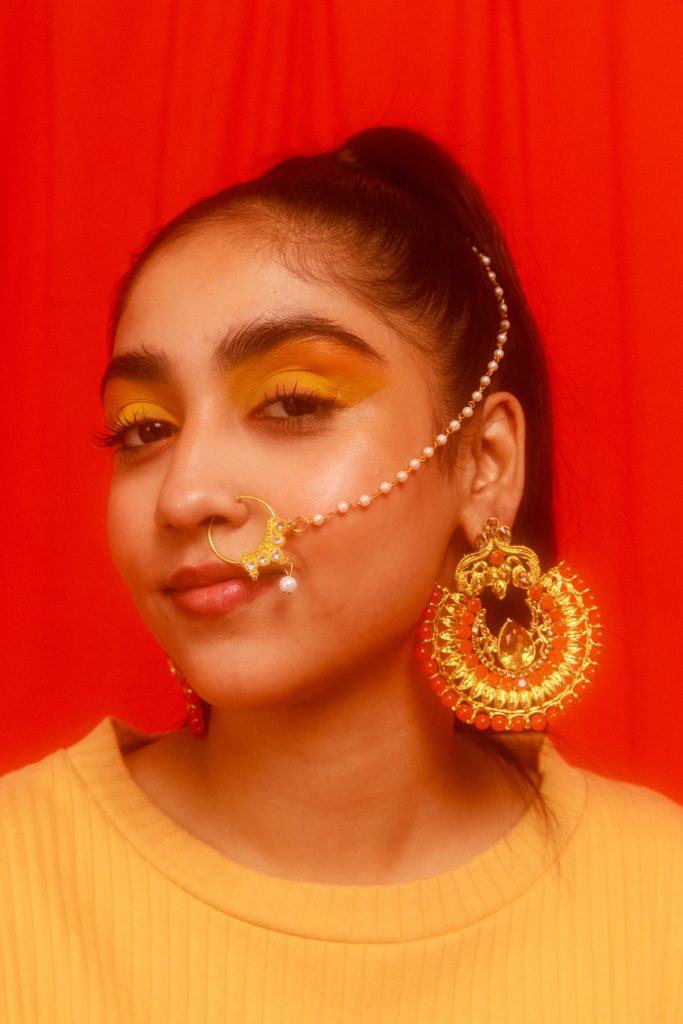
Photography by Alia Romagnoli 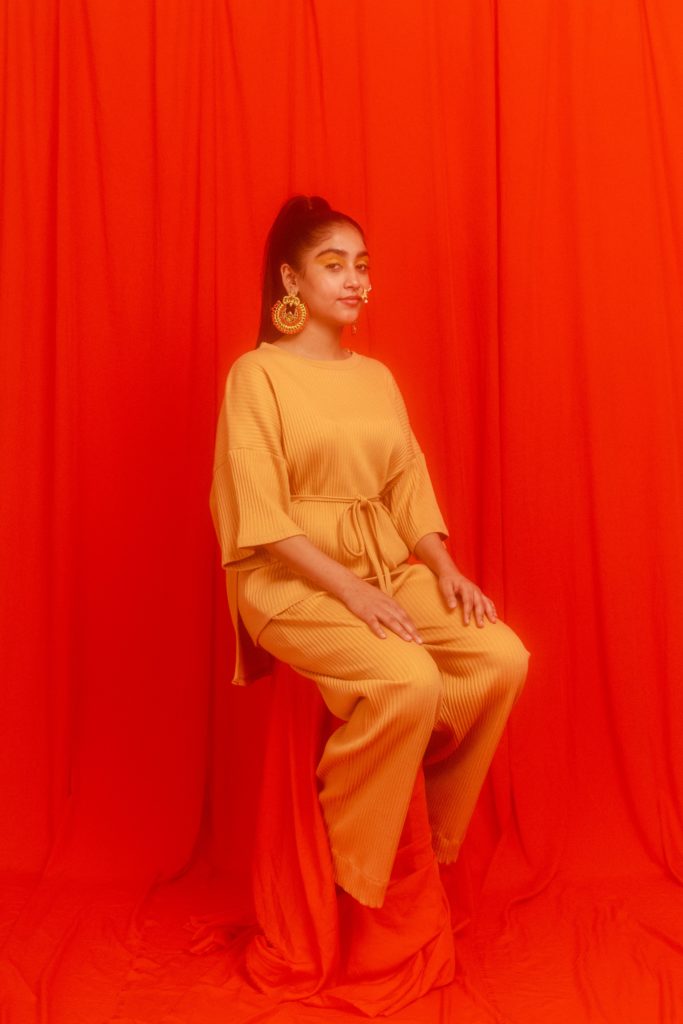
Photography by Alia Romagnoli
Man Like Mobeen explores many modern-day British issues that affect the South Asian community, like Islamophobia, knife crime, class divides and racism. Growing up in Wolverhampton, Dúaa says she didn’t confront too many difficulties, but she’s aware these issues exist and are constantly happening around her. Though, she does remember a few times she’s experienced racism and Islamophobia. “People didn’t know that I was Muslim. I didn’t know I had to tell them. I was in school and then my details came up and it must have said ‘Pakistani’. A few people started saying comments.” Days after Man Like Mobeen first aired, Dúaa found hate pages targeting her. “I was 15 at the time and people put up pictures of me on the internet and said stuff.” Looking back, she realises it was a lot to process at a young age. She remembers grounding herself at the time, trying to ignore it and focusing on the support instead.
Nowadays, she’s aware that she too has a voice and is conscious of how she uses it. “I feel like if I didn’t go on the show, I wouldn’t have the platform that I have now to spread awareness of different things.” She tells me that she’s previously written Instagram stories about the Uyghur camps in China as well as the political situation between Iran and America. Dúaa is passionate about spreading awareness on Islamophobia and will continue to do so as long as she has a platform.
Dúaa reveals acting had always been a dream because growing up she was obsessed with High School Music. She never thought of it as a career, until one day her older sister saw an ad for Man Like Mobeen auditions on Instagram. “They asked for a self-tape, I sent them one and then was asked to come and improvise in front of Guz. I spoke about Pakistan and goats.” A mutual bond meant the rest was history. Dúaa says Guz is like a big brother to her. “He constantly comments on my life and tells me to do my work and study. We just have a laugh.”
She believes Guz’s training initiative, which offered six entry-level placements to people from around the Birmingham area to work behind-the-scenes on Man Like Mobeen, to increase the number of working-class people in TV, is amazing. “Honestly, it’s made them realise that this is what they want to do. And it’s all down to Guz really, him giving people the opportunity.”
“They asked for a self-tape, I sent them one and then was asked to come and improvise in front of Guz. I spoke about Pakistan and goats”
Dúaa Karim
Since Man Like Mobeen, Dúaa herself has found more acting opportunities – upcoming projects include a short film called Going Country, which was shot in Lincolnshire. “It’s about trafficking and drugs,” she explains. “There was a social worker on set because the scenes were that intense.”
On whether Dúaa wants go to uni after finishing A-Levels or carry on with acting, she explains: “I’m going to have a really long think about acting because I think it’s not guaranteed. There could be a long period of time when I’m not in a job, but I don’t want to be sitting at home doing nothing, so I also want to get my YouTube channel running properly.” She says her mum wants her to think about uni, even if it’s a part-time course. “If I did go there, it’d be to study law but studying law hasn’t made me interested in law. In fact, it’s made me realise it’s not what I want to do. I really want to carry on with acting. Doing acting has made me want to do acting even more.”
But I know Dúaa is just getting started. She may have been a normal teenager from Wolverhampton who landed a major role on a BBC drama a few years ago, but you can tell her talents and determination will take her far. She is self-aware, humble, conscious of the world around her and hasn’t lost interest in education during the most exciting time of her acting career. Whatever she ends up doing, this won’t be the last time we see her on our screens.
Man Like Mobeen Series 3 is available to watch now on BBC Three/iPlayer.








